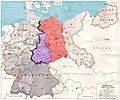IG Farben facts for kids
IG Farben (short for Interessen-Gemeinschaft Farbenindustrie AG) was a huge group of German chemical companies. It was formed in 1925, bringing together famous companies like BASF, AGFA, and Hoechst. The name Farben means "paints" or "colors" in German.
At first, many of these companies made dyes for coloring things. But soon, they started making many other advanced chemicals. IG Farben became very powerful, almost completely controlling chemical production in Germany. During the time of the Nazi government, IG Farben also made a chemical called Zyklon B.
Contents
What Was IG Farben?
IG Farben was a very large conglomerate. This means it was a single company made up of many smaller, different companies working together. It was created after World War I to help German industries grow stronger.
A Giant Company
When it was formed in 1925, IG Farben was one of the biggest companies in the world. It brought together many important German chemical businesses. These companies had a lot of knowledge about chemistry and how to make new products.
Making Important Chemicals
IG Farben made many different kinds of chemicals. They produced dyes, medicines, plastics, and even chemicals used in agriculture. Their work was very important for Germany's industries and economy. During World War II, the company also produced chemicals for the German government, including Zyklon B.
After the War
After World War II ended in 1945, Germany was divided into different zones controlled by the Allied powers. Because of its size and its role during the war, IG Farben was broken up into its original companies. This happened in 1951. Many of the companies that were once part of IG Farben, like BASF and Bayer, still exist today as major chemical and pharmaceutical companies.
Images for kids
-
Carl Duisberg, who was in charge of Bayer, suggested in 1904 that Germany's dye and medicine companies should join together.
-
The IG Farben building in 2007.
See also
 In Spanish: IG Farben para niños
In Spanish: IG Farben para niños
 | Leon Lynch |
 | Milton P. Webster |
 | Ferdinand Smith |








